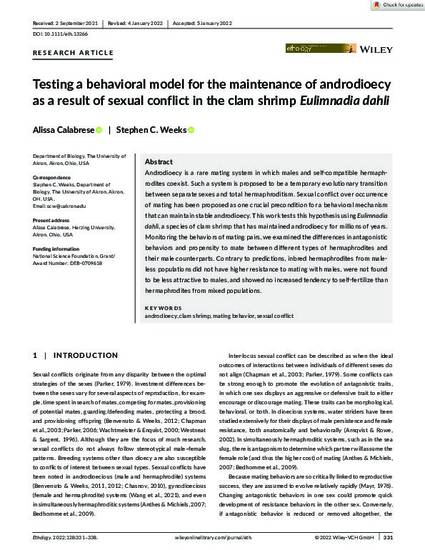
Article
Testing a behavioral model for the maintenance of androdioecy as a result of sexual conflict in the clam shrimp Eulimnadia dahli
Ethology
(2022)
Abstract
Androdioecy is a rare mating system in which males and self-compatible hermaphrodites coexist. Such a system is proposed to be a temporary evolutionary transition between separate sexes and total hermaphroditism. Sexual conflict over occurrence of mating has been proposed as one crucial precondition for a behavioral mechanism that can maintain stable androdioecy. This work tests this hypothesis using Eulimnadia dahli, a species of clam shrimp that has maintained androdioecy for millions of years. Monitoring the behaviors of mating pairs, we examined the differences in antagonistic behaviors and propensity to mate between different types of hermaphrodites and their male counterparts. Contrary to predictions, inbred hermaphrodites from male-less
populations did not have higher resistance to mating with males, were not found to be less attractive to males, and showed no increased tendency to self-fertilize than hermaphrodites from mixed populations.
Keywords
- androdioecy,
- clam shrimp,
- mating behavior,
- sexual conflict
Disciplines
Publication Date
Winter January 5, 2022
DOI
10.1111/eth.13266
Citation Information
Stephen C. Weeks and Alissa Calabrese. "Testing a behavioral model for the maintenance of androdioecy as a result of sexual conflict in the clam shrimp Eulimnadia dahli" Ethology Vol. 18 (2022) p. 331 - 338 Available at: http://works.bepress.com/stephen_weeks/11/
